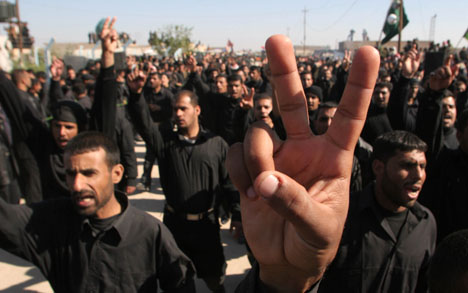Sect leaders ask for peace in Iraq

Members of the Mahdi army, followers of radical Shiite cleric Muqtada al-Sadr take part in a parade marking the seventh anniversary of the death of Muqtada’s father Mohammed Sadiq al-Sadr, in Najaf, Iraq, Sunday, Nov. 26, 2006. (AP Photo/Alaa Al Marjani)
Nov 27, 2006
Last updated on May 12, 2016 at 06:31 a.m.
BAGHDAD, Iraq – Sunni, Shiite and Kurdish leaders called Sunday for an end to Iraq’s sectarian conflict and vowed to track down those responsible for the war’s deadliest attack.
But as they went on national television trying to prevent an all-out civil war in Iraq, fighting between Iraqi security forces and Sunni Arab insurgents raged for a second day in Baqouba, the capital of Diyala province north of Baghdad.
By the end of the day, the province’s latest casualty figures were a microcosm of the brutality in Iraq: 17 insurgents killed, 15 detained, 20 civilians kidnapped and three bodies found. The mayor of a municipality also narrowly escaped an assassination attempt that killed one of his guards and wounded three.
During Saturday’s fighting in Baqouba, police killed at least 36 insurgents and wounded dozens after scores of militants armed with assault rifles and rocket-propelled grenades attacked government buildings in the city center, police said. The fighting raged for hours in the city, about 35 miles northeast of Baghdad.
Get The Daily Illini in your inbox!
Also Saturday, one U.S. Marine was killed and two were wounded when a roadside bomb exploded near their vehicle in Diyala province, the military said.
Officials including Defense Minister Abdul-Qader al-Obaidi and Gen. George Casey, the top U.S. commander in Iraq, decided Saturday to fire Diyala’s police commander, saying he was unable to stop infiltration of the force by Sunni insurgents, two Iraqi officials said on condition of anonymity as is often the case in areas subjected to widespread fighting and revenge killings.
One of the main challenges for U.S.-led forces in recruiting and training Iraqi military and police forces is that they are often infiltrated by insurgents who kill and kidnap in disguise.
“We promise the great martyrs that we will chase the killers and criminals, the terrorists, Saddamists and Takfiri (Sunni extremists) for viciously trying to divide you,” Shiite Prime Minister Nouri al-Maliki, Sunni Parliament speaker Mahmoud al-Mashhadani and Kurdish President Jalal Talabani said in their joint statement on state-run TV.
In addressing “the great martyrs,” they were referring to the 215 people who died when suspected Sunni insurgents attacked Sadr City, the capital’s main Shiite district, on Thursday.
Al-Maliki also urged his national unity government of Sunnis, Shiites and Kurds to end their public disputes and curb sectarian violence.
“The crisis is political, and it is the politicians who must try to prevent more violence and bloodletting. The terrorist acts are a reflection of the lack of political accord,” al-Maliki said.
He is facing strong criticism from top Shiite and Sunni Arab leaders alike as he prepares for a summit in neighboring Jordan with President Bush on Wednesday and Thursday.
Al-Maliki visited Sadr City on Sunday afternoon and paid condolences to some of the relatives of those killed Thursday in the bombings, but as he drove away at the end of his visit, several teenagers hurled stones at his motorcade, residents said.
A total of 43 people were killed or found dead in Iraq on Sunday, police said.





